综合英语教程(第三版)5电子教案unit7section1
最新综合英语教程第五册 课后答案 课件Unit-07-the art of smart guessing

综合教程5(第2版)电子教案
Text Introduction | Culture Notes | Author | Structure
Group Discussion Can you give an example of a Fermi problem?
As we all know, China has the largest population in the world, the majority of which are engaged in agriculture. How many women in China do you think engage in agriculture?
新世纪高等院校英语专业本科生系列教材(修订版) 综合教程第五册(第2版) 电子教案
Unit 7 The Art of Smart Guessing
上海外语教育出版社 南京信息工程大学 刘杰海
Contents
Learning Objectives Pre-reading Activities Global Reading Detailed Reading Consolidation Activities Further Enhancement
综合教程5(第2版)电子教案
Picture Activation | Pre-questions
What do you see from the picture?
综合教程5(第2版)电子教案
Picture Activation | Pre-questions
1. When making decisions, we are supposed to rely on the exact information relevant. However, for reasons such as lack of time, or statistics, we sometimes would have to resort to guessing. Do you often make guesses? Are all your guesses "wild" ones or are they sometimes based on estimations? Open discussion.
综合英语教程(第三版)5电子教案unit1-topic2
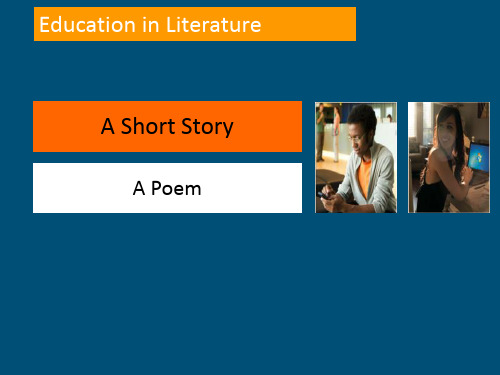
forward to and won’t need me to support them. It all really gets me down.
With such lousy marks on my transcript I couldn’t get into a good cramming class – only into one that’s got kids with really hopeless scores in it. We’re all pretty down about it. One of the boys complained in class, “What crimes have we committed? Why’ve we got to work even harder than adults?” “Your crime was failing the college entrance exams,” the teacher said, “and that’s serious. It isn’t easy for your parents to find the money to send you to this class. You have to feel sorry for them.” He had us all in tears. But who feels sorry for us?
college the only thing for one to do in education? 3. What are the social, economical and cultural reasons for
this nation-wide college mania?
综合英语教程(第三版)5电子教案unit1-topic3

T1
Read each paragraph below and write a sentence to sum it up.
3 The intelligenceTinhoaefbiclmihtyaildjotrorenpcrowonbictleehnmAtrDaotHfeDAoDinsHnDtaosrpkmasatielt,hnaatsnt drisetqhtuheieyreir show no signs of sseursiotauisneedmaottteionntiaoln.disturbance. According to one view, their diverse symptoms are due to an impaired ability to postpone action in favor of thought. Consequently, they do poorly on tasks requiring sustained attention, and they find it hard to ignore irrelevant information.
more likely to come from homes in which marriages are unhappy
and family stress is high. But researchers agree that a stressful
home life rarely causes ADHD. Instead, the behaviors of these
Main idea?
T1
Read each paragraph below and write a sentence to sum it up.
综合英语教程(第三版)5电子教案unit3part1

that had crawled all the way up from Miramar and lay in wait for us somewhere in a deep pool of the arroyo – a monster no less real because he lived only in our imagination. 4 When the older boys of the village came to the pond on Sunday afternoons we watched them swim and dive. From a high branch of the big nogal they dropped a swing made of bush vines we called liana, braided like the women of the pueblo3 did their hair. The boy who was to dive next waited up in the nogal.
Comprehension questions
1. In what way is the village Jalcocotan an easy place for cபைடு நூலகம்ildren to live?
2. What are the examples of children’s easy and carefree lives?
EDUCATION
POSITION Report
Advanced English 5
综合英语教程(第三版)5电子教案unit 2-section 2

One is the subject which is concerned more with theories, and the history of theories, than with the storing of the mind with such information and knowledge as theories are built upon: such a subject, and a very popular one, is economics, which consists of a number of complicated and contradictory theories, a subject by no means proved to be a science, usually based on illicit assumptions, the bastard progeny8 of a parent it disowns, ethics. Even philosophy, when divorced from theology and from the knowledge of life and of ascertainable facts, is but a famishing pabulum, or a draught stimulating for a moment, leaving behind drought and disillusion.
Those who have a real genius for acquiring these dead languages are few, and they are pretty likely of their own accord to devote themselves to the Classics – if they are given the opportunity. But there are many more of us who have gifts for modern languages, or for our own language, or for history, who have only a modest capacity for mastering Latin and Greek. We can hardly be expected to realize, during adolescence, that without a foundation of Latin and Greek we remain limited in our power over these other subjects.
综合英语教程(第三版)5电子教案unit5section3
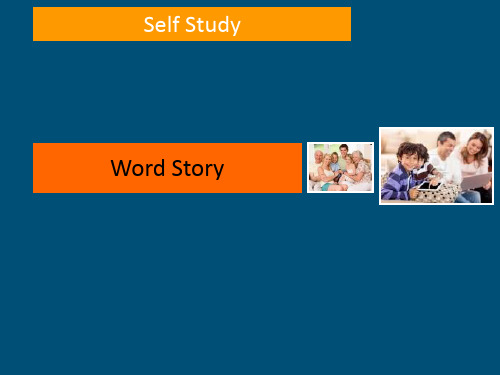
4. authorize: v. to give official permission for something e.g. The CEO has authorized his deputy to act for him during his absence.
10. warrant: v. to promise that something is true e.g. The Author hereby warrants that the Publisher is the owner of the copyright.
11. validate: v. (formal) to prove that something is true or correct, or to make a document or agreement officially and legally acceptable e.g. The Supreme Court has validated the lower court's interpretation of the law.
Main idea
2
Unlike anthropologists or sociologists, historians have not studied family life very closely. Until recently we knew very little of the age at which people married in Western Europe in the centuries earlier than the nineteenth or how many children they had, or what the rates of illegitimacy might be or whether, newly wed, they lived with their parents or set up a house of their own. Few of these questions can be answered with exactitude even now, but we can make better guesses. We know even less, however, of the detailed sexual practices that marriage covered: indeed this is a subject to which historians are only just turning their attention. But we do know much more of the function of
综合英语教程(第三版)5电子教案unit8section3
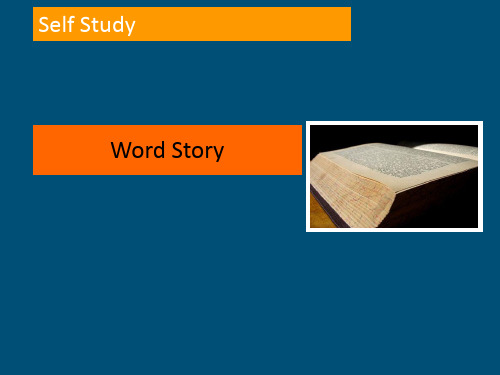
Word Story
talisman ቤተ መጻሕፍቲ ባይዱ.
1. an object held to act as a charm to avert evil and bring good fortune
2. something producing apparently magical or miraculous effects
A good story is always able to produce a central idea, creating either affective or intellectual, or both effects on the
reader. This central idea is called theme. The affective effect refers to the reader’s emotional responses to the fate of some characters or the events in the story. The intellectual effect is the reader’s penetration through the superficial phenomena in order to access the deeper meaning of the story. The writer sometimes intends these effects to be created through his story. But quite often, he has no clear idea of why he wants to create this story. Maybe he wants to make money, maybe he wants to express himself, or maybe he just wants to tell the story. A reader, thus, has to depend on his intellectual analysis to find out about the theme of a story.
全新版大学英语综合教程第三册教案Unit7
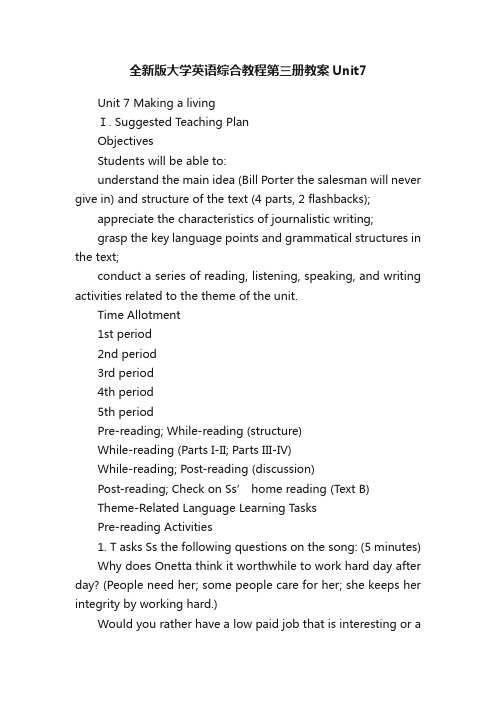
全新版大学英语综合教程第三册教案Unit7Unit 7 Making a livingⅠ. Suggested Teaching PlanObjectivesStudents will be able to:understand the main idea (Bill Porter the salesman will never give in) and structure of the text (4 parts, 2 flashbacks);appreciate the characteristics of journalistic writing;grasp the key language points and grammatical structures in the text;conduct a series of reading, listening, speaking, and writing activities related to the theme of the unit.Time Allotment1st period2nd period3rd period4th period5th periodPre-reading; While-reading (structure)While-reading (Parts I-II; Parts III-IV)While-reading; Post-reading (discussion)Post-reading; Check on Ss’ home reading (Text B)Theme-Related Language Learning T asksPre-reading Activities1. T asks Ss the following questions on the song: (5 minutes)Why does Onetta think it worthwhile to work hard day after day? (People need her; some people care for her; she keeps her integrity by working hard.)Would you rather have a low paid job that is interesting or awell-paid job that is boring?2. Role play: Classroom salesman (25 minutes)T lets Ss read the title of Text A, then announces that the class is to do a role-play. One student will act as a salesperson. All other students will act as his / her potential customers.T appoints a student with a relatively advanced level of English to act as the salesperson. He / She will leave the classroom, think of a product to sell, and plan his / her sales talk. The product should be relevant to campus life.After the salesperson leaves the classroom, T selects several Ss at random. Only they can buy from the salesperson. All other Ss must come up with an excuse not to buy.T invites the salesperson back into the classroom. He / she has 10 minutes to close a deal.Ss discuss with their neighbors the qualities of a good salesperson.3. T leads in to the text by saying: From the role-play we know the sale of goods is rather a difficult job. It is even more difficult for a handicapped person, like Bill Porter in Text A. (1 minutes) While-reading activities1. Text structure (9 minutes)1) Ss scan the text to see if there is any natural division of parts in the text. (Asterisks divide the text into 4 parts.) Ss read the first paragraph of each part, locate the time words or references to time. (They are: 5:45, 7:45, “This is the moment he’s been preparing for since 5:45 a.m.”, after 7 p.m.) By then Ss will realize that the text is about a typical day of salesman Bill Porter.T explains language points in Parts I - II and gives Ss practice (see Language Study). (25 minutes) Ss re-read Parts I - II to finda flashback. Then, by reading the sentences preceding and following the flashback, they will see how skillfully it is woven into the narration. (10 minutes)T explains language points in Parts Ⅲ-Ⅳand gives Ss practice (see Language Study). (35 minutes)Ss re-read Parts III — IV to find another flashback. Then, by reading the sentences preceding and following the flashback, they will see how skillfully it is woven into the narration. (10 minutes)Post-reading Activities1. Group discussion (25 minutes)1) Ss form groups to discuss the following questions:What has Bill Porter been struggling for all his life? Do you think it is worth his efforts?How do you feel about Bill Porter? Why?What characteristics of journalistic writing do you find in this article?Some groups report to class.T explains in more detail the characteristics of journalistic writing (see Text Analysis).T guides Ss through some after-text exercises. (30 minutes) T checks on Ss’ home reading (Text B). (3 minutes)Ss do Part IV: Theme-Related Language Learning Tasks. (1 period)T asks Ss to prepare for the next unit: (2 minutes)do the pre-reading task;preview Text A.Ⅱ.Text AnalysisThis article first appeared in a newspaper; therefore it carries many characteristics of journalistic writing.First of all, a journalist tries to be objective in reporting. As a result, third-person narrative is usually preferred over first-person narrative. Moreover, the journalist would not make any comments to reveal his / her feelings, but simply give the facts.Secondly, an eye-catching beginning helps lure readers to linger more on the story out of an overwhelming number of stories offered by the day’s newspaper. For example, at the beginning of this story, we learn that it takes our physically deformed hero great efforts to get up so as to do something important, yet what is this something? We are kept in suspense until the fourth paragraph.Thirdly, the vocabulary is simple, the sentences and paragraphs short, sometimes elliptical (see after-text exercise on ellipsis). When needs (for emphasis, to list a series of rapidly conducted activities, etc.) arise, a paragraph is as short as one sentence.Lastly, conversations can be transcribed word for word if they illustrate the theme, like the one in the text between Bill Porter and his indecisive female customer.Ⅲ. Cultural Notes1. Salesmanship: Sales promotion is an element of the marketing process that can close the sale of goods or services to a potential customer by providing the incentive to make a positive purchasing decision. Sales promotion, advertising, and salesmanship are the major techniques used in merchandising products to the public. Salesmanship often takes the form of a face-to-face encounter between the buyer and seller; the presentation is set up to convince customers that the product on sale is essential to their satisfaction. The lack of personal feedback between buyer and seller is sometimes considered adrawback of the advertising approach. Selling by telephone, although it is significantly less effective than personal selling, is still considered an important method of merchandising. In the 1980s, a growing promotional technique involved in-home shopping programs using cable television channels. In recent years with the help of the Internet online shopping is becoming popular.The traveling salesman appeared late in the 19th century both in Europe and in the U.S. The early itinerant peddler carried his goods on his back or on his horse, working his way from a port city through the hinterlands. With the coming of the railroad and the assurance given to sellers by new credit-reporting systems, salesmen with their sample cases moved across the land. Persuasive skill was less important in those days of unsatisfied demand, and orders were readily forthcoming. By 1900, however, with the increasing supply of manufactured goods, buyers became more discriminating in their purchases. Greater attention was given to training the sales force and to providing buyer incentives. The growth of industrialization and urban living led to the development of merchandising as a major business endeavor. The use of sales promotion practices experienced steady growth in the 20th century.The techniques of sales promotion are used both to motivate salespersons to improve their performance and to induce consumers to purchase goods and services. Although sales promotion works most closely with advertising, it is also related to other elements of marketing: production services, packaging, price, and distribution. At the manufacturing and wholesale levels of distri-bution, the methods used to motivate personnel to meet specific goals usually fall into two categories —salesincentive prizes (such as merchandise, travel, or cash awards) and sales contests. Both are based upon the salesperson reaching an objective above the normal salesquota.Consumer promotions encompass a wide variety of techniques, including sampling of goods or services, store redeemable “money-off’ coupons to encourage the trial of products, special price-reduced packages, mail-in premium merchandise offers, cash or coupon refunds by mail, special product packaging, contests, and sweepstakes. During recessionary periods, when the demand for consumer expendable dollars becomes more competitive, there is greater participa-tion in refund, coupon, and premium offers. More than half the households in the U.S. take advantage of some sales promotion offers each year.Sales promotion, now fully recognized as a vital element in the marketing mix, has become a multibillion dollar industry. In recent years, sales promotion expenditures have exceeded monies spent on advertising and there are strong indications that this pattern of growth will continue to maintain its economic edge.Ⅳ. Language Study1. linger: 1) spend a long time doing sth.Examples: My daughter used to linger long over her meal.There will be no time to linger—the press conference will begin in a few minutes.2) stay for a long time, esp. because one does not want to leaveExamples: It is a dreary little town where few people would choose to linger.He was still lingering around the stadium long after the game was over.2. scar: a mark left on the skin by a wound, burn, etc. after it has healedExamples: It’s easy to recognize the little boy because he has a scar on his left arm.The witness told the police that the criminal had a scar on his forehead.vt. leave a scar onExamples: The burns were so severe that he will be scarred for life.Her face was scarred by smallpox.So, too, do the voices of those who...: The voices of those who ... also echo in his soul. dignity: the quality of being worthy of honor or respectExamples: A physician shall be dedicated to providing competent medical service with com-passion and respect for human dignity.Some think that cloned human beings will be deprived of freedom or dignity or personal identity. They hold on to the faith that the value of life depends on its dignity and not its success.5. cripple: 1) cause to become unable to move or walk properlyExamples: At the beginning of the year 2000 crippled children were on state lists to receive care.Peter’s father was crippled by a stroke.2) damage or harm (sb./sth.) seriouslyExamples: Shootings and robberies of tourists over the past several years had crippled the tourist industry in Miami. The terrorists’ attack has not crippled the US economy.6. betray: show a lack of loyalty to; give or show (sb. / sth.) to an enemyExamples: According to the Gospels of Matthew and Mark, greed made Judas betray Jesus to the chief priest for 30 pieces of silver.He was accused of betraying his country during the war.It turned out that he was an informer, and, betrayed the plan to the Germans.7. gain on: come closer to, esp. a rival or sth. pursuedExamples: Hurry up — they are gaining on us!She was gaining on her opponents throughout the race, but only overtook them at the very end.8. tremble: shake from cold, fear, weakness, etc.Examples: Her hands grew very cold and trembled so that she could hardly hold the flag. Madison was extremely pale and trembled excessively as he began his inaugural address.For much of the day the pavements tremble from the weight of passing traffic.9. kick up: (cause to) riseExamples: The horses kicked up a cloud of dust.The boys kicked up the leaves that lay thick upon the ground with the coming of autumn.10. tilt: (cause to) move into a sloping positionExamples: The pilot can tilt the helicopter forward, backward, or to either side.In the northern hemisphere, the sun climbs high in the sky and the days are long in summer, when the northern end of th e earth’s axis is tilted toward the sun.n.Examples: The Leaning Tower of Pisa is renowned for itsmarked tilt.The amount of daylight in a day varies throughout the year, based on the tilt of Earth’s axis.11. lean: (cause to) be in a sloping position; bendExamples: He leaned his bike against the wall.She leaned over the bridge to look at the boats passing beneath it.a. producing little of value; containing little or no fatExamples: The company has apparently recovered from several lean years.The recession and lean state budgets continued to trouble school officials.We like to eat very lean and tender meat.12. delivery: 1) the process of birthExamples: Women who do manual work have easy deliveries. In the end, it was an easy delivery:a fine baby boy.2) the delivering of letters, goods, etc.Examples: Federal Express Corporation provide rapid delivery of packages, letters, and other shipments within the United States and worldwide.Most newspapers offer home delivery.13. section: any of the parts into which sth. is dividedExamples: This article consists of ten major sections.Newspapers typically have sections for local news, sports, arts and entertainment, business, and classified advertising.14. disorder: disturbance of the normal working of the body or mind; lack of order Examples: Severe vitamin and mineral deficiencies can lead to mental disorders. Acupuncture is an ancient Chinese practice that treats disorders by insertingneedles under the skin.The school authorities took immediate action to stop campus violence and disorder.15. transfer: move from one place to another (usu. used in the pattern: transfer sth. / sb. (from...to)) Examples: Transferring Peter from Tokyo to the Boston office was a smart idea. Power was transferred from the President to the Vice President while the President received medical treatment.Commercial airports are designed to transfer passengers and freight to and from aircraft. Creditsearned at junior colleges could be transferred to another institution where students could complete their final years of college.He was transferred from Crystal Palace to Arsenal for £ 2.5 million.16. limitation: lack of abilityExamples: Electric cars could travel only a short distance before they needed recharging, due to the limitations of battery technology.Acupuncture is good for some medical conditions but it has its limitations.As a student he recognized his limitations, but did little to improve himself.17. apply for: make a formal request forExamples: I applied for five jobs before I was offered this one.According to the school regulations students will have to apply for permission to study abroad. 18. representative: a person who represents othersExamples: Egypt, Israel, and the representatives of the Palestinian people will participate in negotiations on theresolution of the Palestinian problem.Representatives from more than 170 nations converged on Paris for the Earth Summit.19. literature: 1) printed material used to advertise or promote a productExamples: My friend is sending me literature from two other companies that provide a similar service.There is quite a lot of literature available on the history of computers.2) writings that are valued as works of artExamples: Many readers consider the novel the most flexible type of literature.The graduate school offers master’s or doctoral degree programs for advanced study in such liberal arts and science fields as history, chemistry, physics, and literature.20. pledge: a solemn promiseExamples: They made a pledge to accomplish the task.The boy made a pledge to get straight A’s at the end of the semester.vt.Examples: Member nations of the UN pledge to settle their disputes peacefully and to refrain from using force.They have pledged not to dump hazardous wastes into the river.21. retail: the practice of selling goods in small quantities to the general publicExamples: Wal-Mart is a company that operates a variety of retail chain stores.Department stores refer to large retail stores selling many different kinds of merchandise arranged in separate departments.22. transit: passage through or across; a system of urban public transportationExamples: Our fleet made the transit through the Panama Canal without any difficulty.The president wants to improve the nation’s highways and mass transit systems.23. strain: injure (the body or the part of it) or make it weak by too much effortExamples: Swimming does not strain joints and connective tissue as much as many other forms of exercise.He strained his back when he removed the piano with his friends.n. a severe demand on mental or physical strength, resources, abilities, etc. (followed by on) Examples: Some young white collar workers are complaining about their job strain.She has been under terrible strain since her company was bankrupted.The vast expansion in college education is putting an enormous strain on the system.24. useless: not fulfilling the intended purposeExamples: Preventing the country from purchasing oil crippled its army and made its navy and air force completely useless.Overpopulation and overcropping are turning approximately 14 million acres a year of formerly fertile land into barren and economically useless wasteland.25. limb: a leg or an arm; a large branch of a treeExamples: The small size a nd weight of dogs’ feet and limbs require less energy to move.No attempt should be made to move broken limbs untilmedical help arrives.The flag was hanging from the limb of a big tree.26. off balance: in an unsteady position or about to fallExamples: The motorcycle knocked him off balance and he fell down on the ground.The sudden pull threw me off balance.27. territory: land a country controls or ownsExamples: The government denies that any of its territory is under rebel control.A country’s embass y in a foreign country is considered its own territory.28. on the phone: be talking to sb. using the phoneExamples: Please wait outside for a moment; the manager is on the phone.She is always on the phone, wanting to know what her husband has been up to.29. register: 1) be recognized or noted mentallyExamples: On occasions what I said didn’t register in my daughter’s brain.The professor’s name didn’t register with the students.2) record a name, an event, etc. for official purposesExamples: The new students were told that they must register with the University before they could claim their grants.The newly purchased apartment is registered in her name, not her husband’s.30. laundry: clothes or sheets, etc. that have been or need to be washedExamples: The new model washing machine offers numerous settings for washing different types and quantities of laundry.A good deal of laundry had accumulated during the past twoweeks, as our washing machine didn’t work.31. profitable: bringing profit or advantageExamples: The trading department of the investment bank buys and sells securities when prof-itable opportunities arise.Based in New York City, Random House owns many of the most prestigious and profitable book publishing companies in the United States.The trade of opium, a highly profitable product for British merchants and eventually an illegal import into China, led to the Opium Wars.I didn’t find the talk very profitable. On the contrary, I thought it was nonsense.32. off one’s feet: no longer s tandingExamples: After the operation the old man had to stay off his feet.The doctor checked his left foot carefully and said he would have to stay off his feet for about two weeks.33. commission: money paid to sb. for selling goods which increases with the quantity of goodssoldExamples: If a salesperson is paid on commission, the amount they receive depends on the amount they sell.Peter gets 10% commission on every photocopier he sells.34. surgery: treatment of injuries or diseases by cutting or removing parts of the body Examples: People have practiced surgery since ancient times, but it did not become a respected science the 19th cent the 19th century.Surgery is the fastest and most effective treatment for tumors that are detected early.35. be laid up (with): stay in bed, be unable to work, etc.Examples: Our math teacher has been laid up in bed with acute flu for a week.The football player was laid up with a twisted knee.36. signature: a person’s name written by herself or himselfExamples: In law, signatures are put at the end of a legal instrument to show that it is valid.A testator unable to write may make an X, and such a mark is considered a valid signature.37. in time: punctually, not too late; eventuallyExamples: The couple have just arrived in time for lunch.She set the alarm so she would wake up in time to go to school.38. go off: (of electric power, a light, etc.) stop functioning or operatingExamples: All the lights suddenly went off and the stadium was plunged into darkness.。
综合英语教程(第三版)5电子教案unit7section2
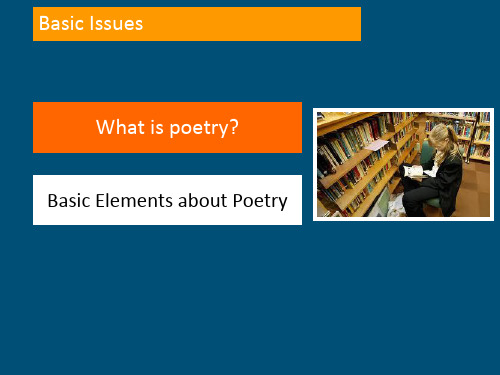
Discussion In a small group, discuss the meaning of the following two quotations:
(1) “painting that speaks” (2) “a little leaf in the drawer of a sublet room”
KEYSs/expressions with examples to illustrate
their usage.
1 figure:
vi. appear in a conspicuous and prominent way e.g. Elections figure prominently in every government program.
Word Study Explain the words/expressions with examples to illustrate their usage.
1 figure: _________________________ 2 take … by the throat: __________________ 3 down to earth: _____________________ 4 fiddle: _________________________
KEYS
1 “painting that speaks”: Poetry is full of imagery of colors, sounds, and other visual and audio effects. 2 “a little leaf in the drawer of a sublet room”: A poem could be someone’s writing such as those things written on the pieces of paper left by the previous tenant in an apartment. 3 It is a little challenging to teach this part since it is comparatively abstract and maybe dull for the students. Try the following approach aimed at materializing the information. At the beginning, introduce the poem, “This is Just to Say” by William Carlos Williams. Hold back the poet’s name first.
综合英语教程(第三版)5电子教案unit8section2
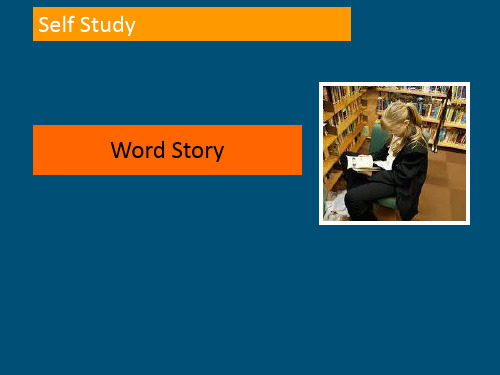
c. reach n. Reach overlaps with range, purview and ken when it means the range of understanding and comprehension. For instance, Globalization is a subject beyond my reach. In addition, reach also means the range or scope of influence or effect, and an expanse as well. For instance, a reach of water.
his ken which he never consciously thought about. And this latecomer has become the major sense of the word in Modern English. For example, Abstract words are often beyond the ken of young children.
“What’s got into everybody this morning?” Tod demanded. Toppy grinned. “Don’t yet worry. Cap’n Jarvis said we’d unload anyway. No matter wot’s wrong.” “Then I’ll bet we do,” said Tod turning toward the port alleyway. All at once he pulled up short 17. Raising his head with a startled movement, he listened. From somewhere behind the shed sounded the crack of a rifle. Tod nodded grimly. This was South America, all right. In the saloon cabin he found Captain Jarvis pacing up and down. “Take a seat, Third. I’ve a job laid out for you.” Tod dropped into a swivel chair before the green baize table.
综合英语教程(第三版)5电子教案unit5section1
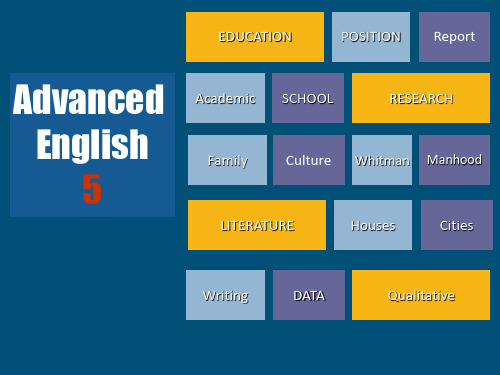
Understand different positions
Understand different positions
3 The value of parental affection to children lies largely in the fact
that it is more reliable than any other affection. One’s friends like
one for one’s merits, one’s lovers for one’s charms; if the merits or
the charms diminish, friends and lovers may vanish. But it is in
times of misfortune that parents are most to be relied upon, in
illness, and even in disgrace if the parents are of the right sort. We
Jane Austen General Paoli
1 On Tuesday, March 31, he and I dined at General Paoli’s. A question was started, whether the state of marriage was natural to man. Johnson, “Sir, it is so far from being natural for a man and woman to live in a state of marriage, that we find all the motives which they have for remaining in that connection, and the restraints which civilized society imposes to prevent separation, are hardly sufficient to keep them together.” The General said, that in a state of nature a man and woman uniting together would form a strong and constant affection, by the mutual pleasure each would receive; and that the same causes of dissension would not arise between them, as occur between husband and wife in a civilized state. Johnson,
综合英语教程(第三版)5电子教案unit 2-section 1
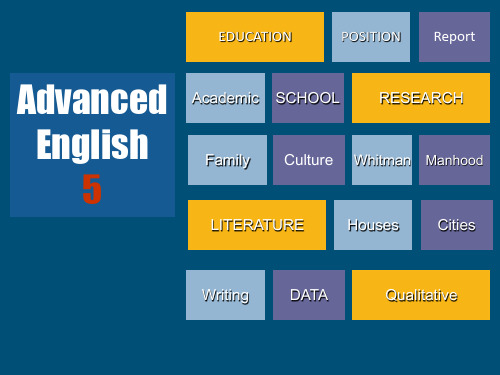
beasts, in ventriloquism, in French and German conversation, in planetary history, in morphology, and in classical Chinese. Actually, the main thing left out of my education was a proper love for my own body, because one feared to cherish anything so obviously mortal and prone to sickness.
aggressive intent. Again the uncle slapped it, scolded it, and sent it away. This treatment went on day after day. After some time, as soon as the kitten saw or smelled that mouse, it screamed and tried to climb up the walls. At that point the uncle lost patience and gave the kitten away, saying that it was stupid and would never learn. Of course the kitten had learned perfectly, and had learned exactly what it had been taught, but unfortunately not what the uncle intended to teach. “I can sympathize with that kitten,” says Chekhov, “because the same uncle tried to teach me Latin.”
综合英语教程(第三版)5电子教案unit1-topic4

4 have it:
accept; take e.g. I’ll have the peas instead of the spinach.
5 stick out:
endure something patiently to the end; put up with something or somebody unpleasant e.g. It was a
the requirements of the curriculum...
7. superintendents: The equivalent of the position is 教育局长 in China.
BACK
8. meeting those...: meeting those requirements as dictated by the curriculum
BACK
15. leave school: graduate (in American English)
BACK
16. Oxbridge: Oxford University and Cambridge University
BACK
17. Yvonne Turner and Amy Acker collaborated in their doctorate research on the Chinese education system when they were teaching English in a Chinese private college. These personal stories were adapted from their research report Education in the New China, published in 2002.
综合英语教程第三版Unit-7PPT课件
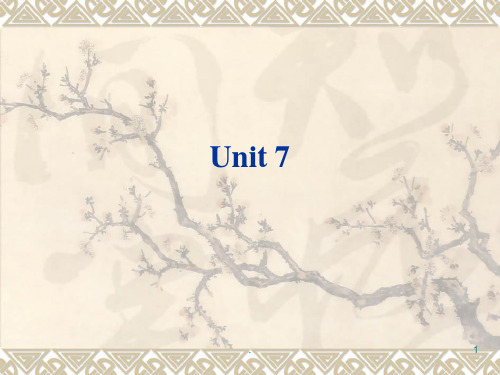
2. Expressions for trades and professions:
education, science, politics, farming, business, trade, medicine, manual labor, journalism, advertising, the army, the police, industry, banking, transportation
❖ Undaunted: not afraid of continuing to try to do sth in spite of difficulties or danger 顽强 e.g. Undaunted by his first setback, he decided to try once more. What an undaunted girl!
❖ Indebted adj. owing money to someone 负债的
e.g. The restaurant is heavily indebted to the bank.
.
12
❖ anonymous 1) (of a person 人) with a name that is not known or that is not made public 不知姓名的;名字不公开的
pack him off: (informal) to send someone to stay somewhere for a period of time e.g. My parents used to pack us off to camp every summer.
.
9
❖ calling 1 profession; trade 职业; 行业
综合英语教程(第三版)5电子教案unit7section3

Modern Poem
I Pre-reading activity What are the absolute terms of love in Chinese culture? Think out at least two and present them to the class. Write down your expressions here.
Ask me no more whither doth stray 19 The golden atoms of the day; For, in pure love, heaven did prepare Those powders to enrich your hair.
Ask me no more whither doth haste The nightingale, when May is past; For in your sweet dividing throat 20 She winters, and keeps warm her note.
KEYS
Answers for reference 1. 海枯石烂心不变。 I will not change my love for you even if all the oceans dry up and the rock rots away. 2. 在天愿作比翼鸟,在地愿为连理枝。 In the sky, we’d be two lovebirds flying on the same wind. On the earth, two intertwined branches of the same root. 3. 问世间情为何物,直叫人生死相许。 What is love? I ask the world. For you, I live and die. 4. 执子之手,与子偕老。 Your hand in mine, together we’ll grow old. 5. 两情若是久长时,又岂在朝朝暮暮。 Time fades away before true love.
综合英语教程(第三版)5电子教案unit5section2
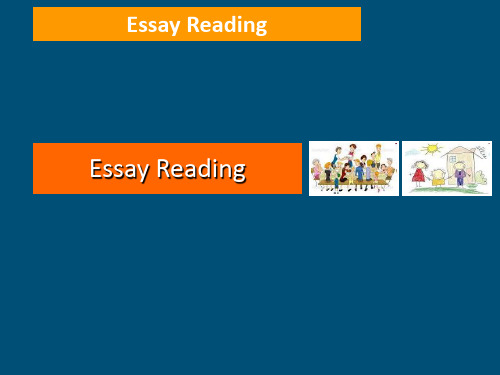
?
Taasskk1s
CThoembpalesticeethleemteansktss obfealofwambailyseadreonhutshbearnedadanindg passage and
wdifiescwusitshionchiinldsrmenalbl goronuipns.wedlock. Relatives
Families may be monogamous or polygamous – there are s3ystems where one man is entitled to several wives and others where several husbands share one wife. A society may recognize primarily the small nuclear conjugal unit of husband and wife with their immediate descendants or it may institutionalize the large extended family linking several generations and emphasizing consanguinity more
than the conjugal bond. Residence after marriage may be matrilocal, patrilocal or neolocal; exchanges of goods and services between families at the time of marriage may be based on bride price, groom price or an equal exchange; endogamous or exogamous regulations may indicate who is and who is not eligible for marriage; the choice of a mate may be controlled by parents or it may be left in large measure to the young persons concerned. These are but a few of the many differences which characterize family structures in variant13 societies.
综合英语教程(第三版)5电子教案unit10section1
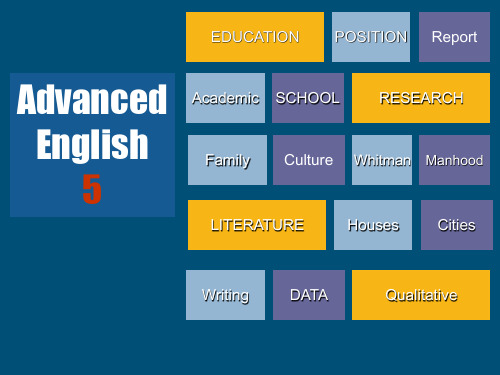
Pre-reading activity
A curator of an architecture museum is presenting a show to a group of middle school students. The theme of the presentation is “Houses.” Read the presentation, and then work in small groups to make a poster for the modern equivalents to those in the show based on the internet research. Write a short text giving necessary information about the houses you choose.
(Pictures of tepees) Houses for buffalo hunters…
4 Not all Native Americans (used to be called American Indians) live in tents (or tepees as they call them). Only those Indian nations that hunted and followed the wild buffalo herds built themselves tepees with long wooden poles and leather skins, which were left over after the hunters had eaten all the buffalo meat or dried it for food in the winter months. Tepees have a small hole at the very top where the smoke can flow out — like igloos. The tents are so light that they can be transported on horseback without any problem.
- 1、下载文档前请自行甄别文档内容的完整性,平台不提供额外的编辑、内容补充、找答案等附加服务。
- 2、"仅部分预览"的文档,不可在线预览部分如存在完整性等问题,可反馈申请退款(可完整预览的文档不适用该条件!)。
- 3、如文档侵犯您的权益,请联系客服反馈,我们会尽快为您处理(人工客服工作时间:9:00-18:30)。
Things I already known about Whitman:
Things I’m not quite Things I learned
clear about him:
after reading
about him:
A professor of American literature is giving a lecture to his students.
W7 alt Whitman was born at West Hills, Long Island, in New York
non May 31, 1819. His father, Walter Whitman 5, was a carpenter and a house builder, and a staunch supporter of the ideals of the American Revolution. Walt attributed his creativity to the influence of his mother, Louisa Van Velsor Whitman. Walt eventually had seven brothers and sisters, of which he was the second oldest.
deep in the soil, and then take flight, just as the tree shoots its
branches into the sky.
4 Sure, this is actually what I am going to talk about today.
of another ground-breaking American writer, James Fenimore Cooper 7.
11 After working in several law offices, he worked as assistant in a
physician’s office. And finally, Walt went to work for a newspaper. He began as an apprentice compositor 8, setting type for various local newspapers. Eventually, beginning in his mid-teens, he also began writing short pieces that appeared in the papers. Like many well-known authors, Whitman began his literary career as a journalist, reporting on a wide variety of topics. He was often asked to review books, operas, and plays during these years, a task that allowed him to indulge in his favorite pastimes: reading and attending the theater, especially opera.
A Poetic Tramp: A Lecture about Walt Whitman 1
1 My last lecture covered poets and their poems before the middle
of the nineteenth century. Today, we are going to study modern American poets and poems. We will start with Walt Whitman. I will first talk briefly about his major contributions to modern American poetry, giving you a short account of his life story. After that, we will read one of his most important poems.
Lecture about Whitman Poem by Walt Whitman
Work on the table below in small groups,, and then read the lecture. After reading, return to this table to finish the last column.
R6ead his poems aloud. Try to catch the sound of Whitman’s voice
in them. Whitman is said to have recited poetry aloud as he walked along the seashore, and you can sometimes almost hear the rhythm of the surf in his poems. You can also sometimes hear the voice of a prophet, as when he cries out, “Unscrew the locks from the doors! Unscrew the doors themselves from the jambs!” 4 Whitman loved the sound of the human voice, in speech and in song, and always imagined himself “singing” aloud in his poems.
EDUCATION
POSITION Report
Advanced English 5
Academic SCHOOL
RESEARCH
Family
Culture Whitman Manhood
LITERATURE
Houses
Cities
Writing
DATA
Qualitative
Unit 7
SUBJECT 3 Learning Literature
Whitman liked to think of the poet as a kind of tramp: someone
who traveled far and wide, meeting new people along the way,
constantly seeking out new experiences and new encounters.
3 For Whitman, poetry was no schoolroom or parlor exercise 2. It wasn’t an “indoor” activity at all. Instead, poetry had to breathe the
open air. It had to start in the earth, just as a tree sets its roots
2 When Walt Whitman began publishing his poems in the
mid-1800s, he forever changed people’s sense of what a poet could be, and what a poem could look and sound like.
1
American Poet Whitman and his life
2
Elements of poetry
3
Analysis of poems
Study these topics in this unit.
Contents of this unit
1 Lecture about Whitman 2 Basic Issues 3 Studying Poems 4 Self study
8 When Walt was not quite four years old, the Whitmans moved to Brooklyn, New York, where Walt’s father continued to build and sell houses. It was a difficult time economically, and Whitman’s father suffered many losses selling the houses he built. Walt managed to attend public schools for six years, until the age of eleven, but was forced to go to work as an office boy to earn money for the family after that. This was all the formal education he ever received. 9 At the age of eleven, Whitman went to work at a law office where he learned writing from work and a local lending library. This was the beginning of Walt’s lifelong love of literature. Among his earliest favorites were the Arabian Nights, the historical novels and poems of Sir Walter Scott 6 , and the adventure novels of
